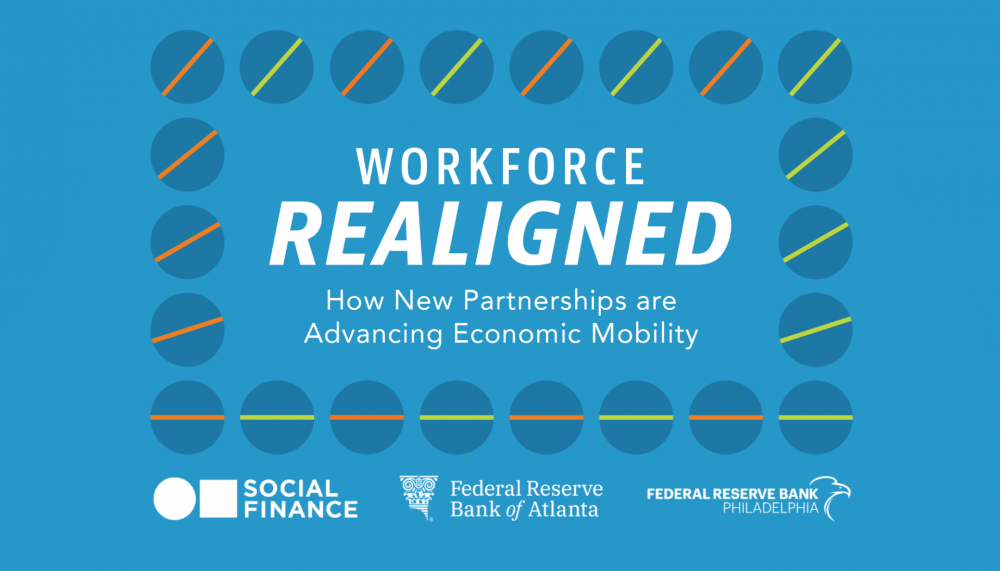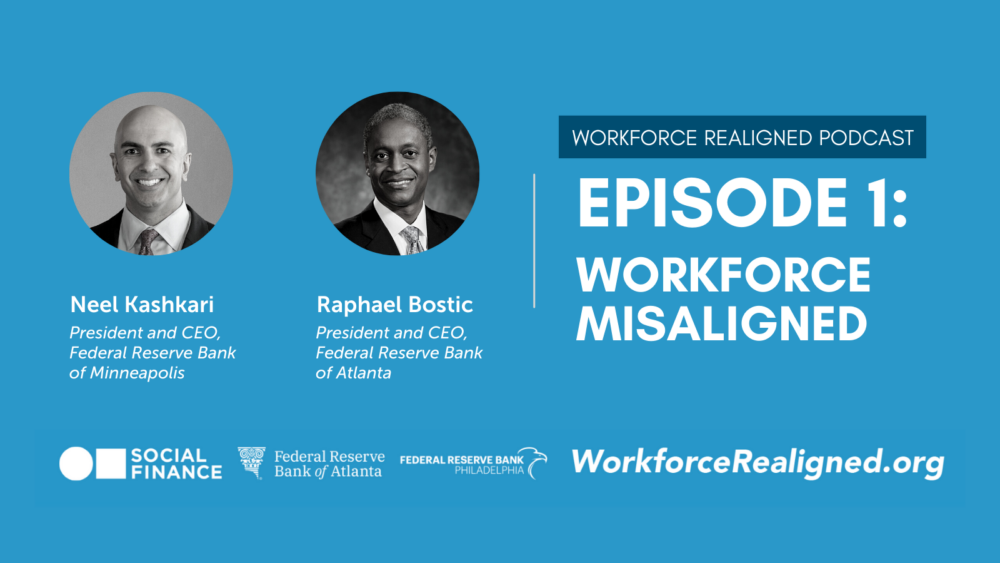
Pioneers in Business, Philanthropy, and Government Discuss New Partnerships to Advance Economic Mobility
From the Social Finance Institute
From the Social Finance Institute
The Social Finance Institute, Workforce Realigned
A new generation of cross-sectoral partnerships are emerging to ensure better outcomes for U.S. workers. At our national launch event of Workforce Realigned: How New Partnerships Are Advancing Economic Mobility—a new book from Social Finance and the Federal Reserve Banks of Atlanta and Philadelphia—leaders in government, philanthropy, and the corporate sector explored the emergence of these unique partnerships, drawing on examples from the recently released book and beyond. The event featured a conversation with U.S. Secretary of Commerce Gina Raimondo, Ford Foundation President Darren Walker, and Bank of America Chairman of the Board and CEO Brian Moynihan, moderated by Social Finance CEO Tracy Palandjian. Hosted by the Federal Reserve Bank of Atlanta, the event also included remarks from its President and CEO Raphael Bostic, New York Times journalist Nicholas Kristof, and Federal Reserve Bank of Philadelphia President and CEO Patrick Harker.
Bostic kicked off the event with a look into the innovative programs underway to increase access to family-sustaining jobs, including the Atlanta Fed’s Center for Workforce and Economic Opportunity and Ask Us Anything webinar series, which connect job-seekers with available local job opportunities and the tangible skills to pursue them. The Philadelphia Fed is promoting upward mobility in similarly innovative ways through initiatives such as the Economic Growth and Mobility Project, which embraces entrepreneurial strategies for inclusive economic growth. “What these programs have in common is they represent a mindset shift away from old models and toward planning around—as we’re talking about—outcomes, outcomes, outcomes, outcomes,” added Harker.
Alongside outcomes, Bostic shared three critical avenues for improving workforce development pathways: building policy around evidence, growing workers’ networks alongside their skills, and forging unlikely partnerships for pioneering solutions. “If we can make progress in terms of those dimensions, resilience, and mobility, we will actually wind up with an economy that does much better at working for everyone.”
Bostic’s confidence in the power of unconventional coalitions was echoed by Palandjian. She underscored the “new breed of partnerships” visible in Workforce Realigned, whose authors—despite their “different perspectives, backgrounds, and beliefs”— share a commitment to realizing a more equitable and resilient workforce system.
In practice, these coalitions are as unique as the initiatives they power. Secretary Raimondo zeroed in on the possibilities that lie at the intersection of government and business, stressing that “the emphasis has to be from the beginning on outcomes, and government has to set the table that way […] then the business community has to come to the table at scale.” Business, she explained, is not just a tool for advancing economic opportunity, but a framework for understanding its trajectory: “Half of the kids who go to college in America don’t graduate. You’d be out of business if that were your business model.”
Moynihan illuminated the tremendous impact that business leaders can make in a community when they work alongside fellow executives, local institutions, and government actors. While Bank of America’s workforce development initiative in Charlotte, North Carolina began with a business system approach, for instance, it excelled by “working together among communities, because no business is going to carry a community. Those days are gone,” Moynihan remarked.
In Connecticut, businesses are stepping up in similar ways. Walker discussed the Ford Foundation’s work with the state of Connecticut to implement a corporate call to action ensuring followthrough on the pledges made in the wake of the nation’s racial reckoning: for corporations, this means committing to “concrete steps and actions to diversify, and to build wealth, and to provide mobility for African Americans and BIPOC [Black, Indigenous, and people of color] employees, and to work with the communities that have historically not benefited from economic opportunity.”
At the same time, Walker reflected, “it’s a really exciting pledge, but it is again nested within a larger challenge.” Equitable workforce recovery is a critical task, a sentiment Kristof seconded: “investments in these kinds of partnerships advance economic mobility in ways that do so much more, and knit together that social fabric, and keep people alive.”
Workforce Realigned both illuminates the urgency of the work ahead and suggests optimism about the future. As Palandjian said, “There’s no doubt we’re in a period of profound change and accelerating uncertainty. But we believe that uncertainty, especially in the wake of the pandemic, represents a powerful opportunity to build back better, ensuring that the workers who are powering our economy are set up to share in its growth.”
Workforce Realigned: How New Partnerships Are Advancing Economic Mobility is a new book from Social Finance and the Federal Reserve Banks of Atlanta and Philadelphia sharing 19 case studies and nascent ideas about how to reboot economic mobility in America—from leaders including U.S. Secretary of Commerce Gina Raimondo, Former Speaker of the House Paul Ryan, Governor Charlie Baker, and General Assembly CEO Lisa Lewin.
The national launch event of Workforce Realigned: How New Partnerships Are Advancing Economic Mobility highlighted the launch of this new book from Social Finance and the Federal Reserve Banks of Atlanta and Philadelphia and discussed…
In this Workforce Realigned podcast episode, Raphael Bostic, President and CEO of the Federal Reserve Bank of Atlanta, and Neel Kashkari, President and CEO of the Federal Reserve Bank of Minneapolis, discuss the need to…
